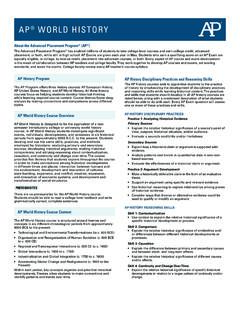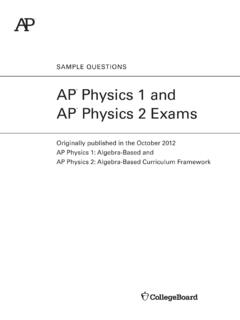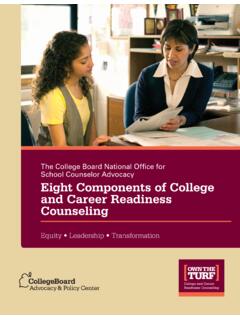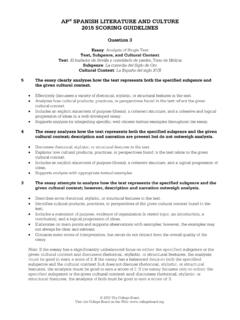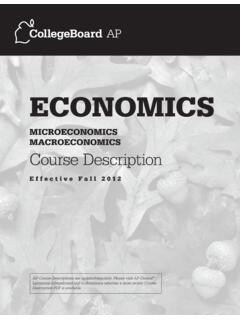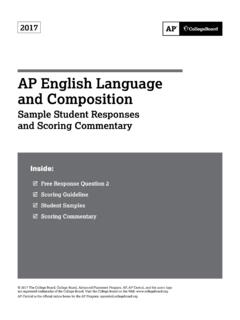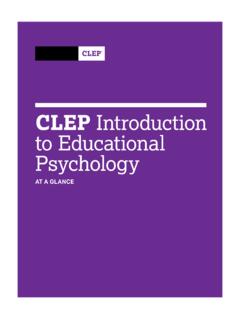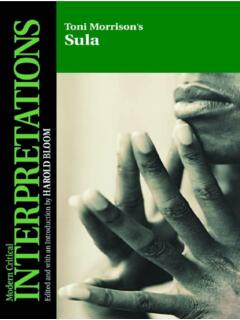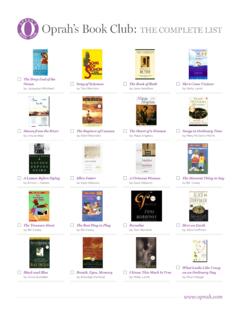Transcription of AP English Literature and Composition 2019 Free-Response …
1 2019 AP English Literature and CompositionFree-Response Questions 2019 The College Board. College Board, Advanced Placement, AP, AP Central, and the acorn logo are registered trademarks of the College Board. Visit the College Board on the web: AP Central is the official online home for the AP Program: 2019 AP English Literature AND Composition Free-Response QUESTIONS GO ON TO THE NEXT PAGE. -2- English Literature AND Composition SECTION II Total time 2 hours Question 1 (Suggested time 40 minutes. This question counts as one-third of the total essay section score.) Carefully read P. K. Page s 1943 poem The Landlady. Then, in a well-organized essay, analyze the speaker s complex portrayal of the landlady.
2 You may wish to consider such elements as imagery, selection of detail, and tone. The Landlady Through sepia air the boarders* come and go, impersonal as trains. Pass silently the craving silence swallowing her speech; click doors like shutters on her camera eye. Line 5 Because of her their lives become exact: their entrances and exits are designed; phone calls are cryptic. Oh, her ticklish ears advance and fall back stunned. Nothing is unprepared. They hold the walls 10 about them as they weep or laugh. Each face is dialled to zero publicly. She peers stippled with curious flesh; pads on the patient landing like a pulse, unlocks their keyholes with the wire of sight, 15 searches their rooms for clues when they are out, pricks when they come home late.
3 Wonders when they are quiet, jumps when they move, dreams that they dope or drink, trembles to know the traffic of their brains, jaywalks their street 20 in clumsy shoes. Yet knows them better than their closest friends: their cupboards and the secrets of their drawers, their books, their private mail, their photographs are theirs and hers. 25 Knows when they wash, how frequently their clothes go to the cleaners, what they like to eat, their curvature of health, but even so is not content. And like a lover must know all, all, all. 30 Prays she may catch them unprepared at last and palm the dreadful riddle of their skulls hoping the worst. *boarders: people who rent rooms in a private homeReprinted from KALEIDOSCOPE by Page by permission of the Porcupine s Quill.
4 Copyright The Estate of Page 2010.. 2019 The College Board. Visit the College Board on the web: AP English Literature AND Composition Free-Response QUESTIONS GO ON TO THE NEXT PAGE. -3-Question 2 (Suggested time 40 minutes. This question counts as one-third of the total essay section score.) Carefully read the following excerpt from William Dean Howells novel The Rise of Silas Lapham (1885). Then, in a well-constructed essay, analyze how the author portrays the complex experience of two sisters, Penelope and Irene, within their family and society. You may wish to consider such literary elements as style, tone, and selection of detail. They were not girls who embroidered or abandoned themselves to needle-work.
5 Irene spent her abundant leisure in shopping for herself and her mother, of whom both daughters made a kind of idol, Line 5 buying her caps and laces out of their pin-money,1 and getting her dresses far beyond her capacity to wear. Irene dressed herself very stylishly, and spent hours on her toilet2 every day. Her sister had a simpler taste, and, if she had done altogether as she 10 liked, might even have slighted dress. They all three took long naps every day, and sat hours together minutely discussing what they saw out of the window. In her self-guided search for self-improvement, the elder sister went to many church lectures on a vast 15 variety of secular subjects, and usually came home with a comic account of them, and that made more matter of talk for the whole family.
6 She could make fun of nearly everything; Irene complained that she scared away the young men whom they got 20 acquainted with at the dancing-school sociables. They were, perhaps, not the wisest young men. The girls had learned to dance at Papanti s;3 but they had not belonged to the private classes. They did not even know of them, and a great gulf divided them 25 from those who did. Their father did not like company, except such as came informally in their way; and their mother had remained too rustic to know how to attract it in the sophisticated city fashion. None of them had grasped the idea of 30 European travel; but they had gone about to mountain and sea-side resorts, the mother and the two girls, where they witnessed the spectacle which such resorts present throughout New England, of multitudes of girls, lovely, accomplished, exquisitely dressed, 35 humbly glad of the presence of any sort of young man; but the Laphams had no skill or courage to make themselves noticed, far less courted by the solitary invalid, or clergyman, or artist.
7 They lurked helplessly about in the hotel parlors, looking on and not knowing 40 how to put themselves forward. Perhaps they did not care a great deal to do so. They had not a conceit of themselves, but a sort of content in their own ways that one may notice in certain families. The very strength of their mutual affection was a barrier to 45worldly knowledge; they dressed for one another; they equipped their house for their own satisfaction; they lived richly to themselves, not because they were selfish, but because they did not know how to do otherwise. The elder daughter did not care for society, 50 apparently. The younger, who was but three years younger, was not yet quite old enough to be ambitious of it.
8 With all her wonderful beauty, she had an innocence almost vegetable. When her beauty, which in its immaturity was crude and harsh, suddenly 55 ripened, she bloomed and glowed with the unconsciousness of a flower; she not merely did not feel herself admired, but hardly knew herself discovered. If she dressed well, perhaps too well, it was because she had the instinct of dress; but till 60 she met this young man who was so nice to her at Baie St. Joan,4 she had scarcely lived a detached, individual life, so wholly had she depended on her mother and her sister for her opinions, almost her sensations. She took account of everything he did and 65 said, pondering it, and trying to make out exactly what he meant, to the inflection of a syllable, the slightest movement or gesture.
9 In this way she began for the first time to form ideas which she had not derived from her family, and they were none the 70 less her own because they were often mistaken. 1 pin-money: money used for small expenses and incidentals2 toilet: dressing and grooming3 Papanti s: a fashionable social dance school in nineteenth-century Boston 4 Baie St. Joan: a Canadian resort 2019 The College Board. Visit the College Board on the web: AP English Literature AND Composition Free-Response QUESTIONS -4-Question 3 (Suggested time 40 minutes. This question counts as one-third of the total essay section score.) In his 2004 novel Magic Seeds, V. S. Naipaul writes: It is wrong to have an ideal view of the world.
10 That s where the mischief starts. That s where everything starts unravelling. Select a novel, play, or epic poem in which a character holds an ideal view of the world. Then write an essay in which you analyze the character s idealism and its positive or negative consequences. Explain how the author s portrayal of this idealism illuminates the meaning of the work as a whole. You may choose a work from the list below or one of comparable literary merit. Do not merely summarize the plot. The Alchemist Antigone The Awakening The bluest Eye Brave New World Brideshead Revisited The Brief Wondrous Life of Oscar Wao Candide The Catcher in the Rye Death of a Salesman Don Quixote A Gesture Life Great Expectations The Great Gatsby The Handmaid s Tale The House of Mirth The Importance of Being Earnest Invisible Man King Lear Lolita The Mill on the Floss My ntonia Native Son Odyssey The Portrait of a Lady A Portrait of the Artist as a Young Man The Sound and the Fury The Sun Also Rises The Tempest To Kill a Mockingbird When the Emperor Was Divine STOP END OF EXAM 2019 The College Board.
